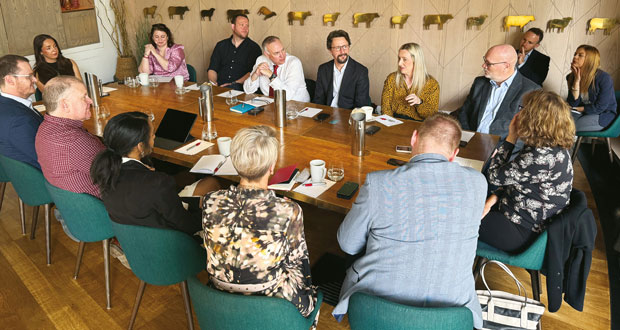FMJ partnered with MRI in a recent roundtable which brought a group of thought leaders from both FM client and services backgrounds together under Chatham House rules to discuss how innovations in AI-based software can be harnessed to deliver intelligent FM solutions
• Sara Bean, Editor, FMJ
• James Massey, MD of Facilities Management at MRI Software
• Emma-Louise Porter, Head of FM & Real Estate Business Partners, Airbus
• Heather Nicholson, UK Head of Facilities, Sika Ltd
• Chris Coath, Director of Energy & Asset Management, NG Bailey
• Emma Wilson, Social Impact Director, Pareto
• Nigel Potter, Director of Strategy, Churchill
• Nicolas Nothard, Commercial Director, ABM
• Tim Rose, VP Global Facilities Management, Elekta
• Les O’Gorman, Facilities Director, UCB Celltech
• Lucy Lloyd, COO, Kingdom Cleaning
• Aymeric Lasselin, MD, Equans Digital
MRI Software carries out a regular Voice of the Facility Manager (VOFM) survey to gauge the barometer of the FM sector, from FM’s concerns to their software needs. Introducing the report, James Massey, MD of Facilities Management at MRI Software said: “We want to make sure we are doing a good job, our technology is doing what it needs to do, and my team are delivering what they need to deliver. If great tech isn’t well used, it doesn’t make sense, so our survey is a litmus test to understand what are the drivers towards the digitisation of services? Towards IoT, smart energy Monitoring, ESG strategy, net zero and carbon? All those things.”
The majority of FMs in the latest survey felt the best reason for adopting new technology in the next 18 months is to improve efficiency and productivity. We asked the panel for their biggest drivers for software investment. Unsurprisingly, new ways of working have had quite an impact.
Said a panellist: “I think the challenge for us as an industry is the working day is no longer nine to five or seven to six. It’s way beyond that, including possibly evenings and weekends.”
Another added: “One of the biggest issues that has hit my team is how is my building being used? How many desks do I need? How often do I need to clean them?”
This has massive implications on cost, technology and deliverability. It also requires software solutions and data to help FMs deliver these more personalised workspaces. A supplier side panellist also revealed their customers are prioritising workplace experience alongside meeting their ESG goals: “This is probably one of the top priorities for them, because not only do they want to retain the staff that they’ve got, they also want to attract the best staff that they can and the incentive for that is to meet increased demands for a high quality workplace experience.”
QUALITY OF DATA
It was agreed that while there is a need for quality data to enable intelligent decision-making processes it’s important to ensure people on the ground are going to use it and understand what it can offer them. This is why, as agreed by our panel, it is important to educate, train and develop people to be able to properly interpret data to help make useful decisions.
Said one: “If we don’t train people and explain the reasons for using new solutions this whole conversation is dead in the water, as most people will only want to use the data if they understand it, it’s not about technology for technology’s sake.”
Massey agreed: “I think the technology has got to be adaptable for all and it’s got to be usable. There’s no point in us providing good tech if no one uses it because it’s too complicated.” He also posed the question; ‘how can organisations have an AI strategy without a data strategy?’ The answer is you can’t, because “AI only knows what it knows”.
The panel also discussed why companies who have got an AI strategy, but no data strategy move into dangerous territory and that no data is better than dirty data. A supplier noted that some companies will ask them to tell them what data they will need, but it’s a much better scenario when a customer says, “we’ve got all this data, we want you to use it” which can enable services providers to deliver a better service.





